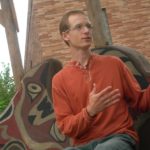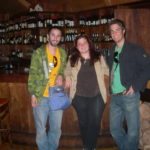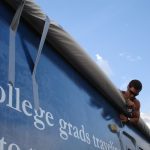When Jim was in the third grade, he wrote an essay about how he wanted to be a professional baseball player when he grew up. Throughout elementary, middle, and high school this dream never faded. That is, until he broke his wrist one year in high school and was unable to play. That year he ended up playing tennis, which moved him away from baseball and geared him more towards an academic career.
After high school, he attended the University of Santa Cruz where he really got into quantitative research as a “Banana Slug.” He began to realize how much fun academics could be. He loved to pose questions about certain topics, his favorite being the realm of psychology. With his love for research, he entered graduate school at UC Davis where he worked towards a doctorate in psychology.
Baseball was a backdrop for Jim while he was in school, and he spent much of his time quantifying baseball. A San Francisco Giants fan, he loved to study their trends and analyze the numbers that the team produced. His wife noticed this passion for baseball research while he was striving for his doctorate in psychology. She asked him why he spent 10% of his time on his dissertation and 90% of his time studying baseball. She encouraged him to find a career in baseball, but Jim felt that there wasn’t much out there in the way of baseball research positions.
After obtaining his PhD he taught in Buffalo, NY and later at the University of Arizona in Tucson. He began noticing that people like him were infiltrating baseball to help general managers with decisions pertaining to baseball operations. While lecturing at the U of A, he started to pester the Arizona Diamondbacks organization with work that he was doing that related to the club. He explained to them that his research had the possibility of improving the decision-making processes of their baseball executives. He offered to perform a variety of quantitative studies and send them their way to show examples of his expertise.
The work that he turned in was placed in the hands of the right people and he was offered a consultant position. In his time as a consultant, he worked extremely hard to keep his foot in the door. In 2004, he was offered a full-time position. He is now the Director of Research for the Arizona Diamondbacks.
His job entails providing statistical evaluations of players. By evaluating them in all types of different scenarios, he is able to supply a quantitative analysis that goes along with a scouting report to help baseball executives with decisions on trades, signing free agents, and the amateur draft as well.
I asked Jim about how someone gets into baseball, to which he replied:
“There are many different ways to get into baseball. Some people are lawyers, others are marketing, some people worked their way in through an internship, others played the game and retired and now are with the organization. There is no one route in, but you have to work really hard to get in, and you have to be willing to take “no” and persist through it, and keep persisting. I felt like I was knocking on this enormous door of the ball club for two and half, three years. And if you count back to when I was doing research it was five to ten years. But when those doors opened up it was like hey, where have you been? But it’s wonderful! It’s a unique place and a unique business.”
I also asked him what is something students should work on while in school. Jim replied:
“Baseball is a people oriented sport. Every organization is people oriented. So you have to get along with people, you have to know how to network, and you have to know how to play on a team. Know what a good a niche is for yourself, and know how to help people out. So one thing you can definitely work on as an undergraduate is networking, and having people know you.”
Interview
Jim Cassandro has the Bill James Abstract on his bookshelf in his office.
How the hell did I get here? It’s kind of strange. When I was a kid, maybe third grade, I wrote an essay about wanting to be a baseball player when I grew up. Baseball was it. All I thought about as a kid in elementary school, junior high school, and high school was baseball.
I loved baseball, loved playing baseball. Academics? Mmmm…maybe I’d get into it at some point.
I always had an ability in math that I didn’t have in other areas. That was kind of nice to know that I had that in my back pocket if I needed it. But for the most part, I loved baseball. I loved being around it. Going to baseball games, and playing it.
And uh, bit by bit, I’m going through life. One year in high school I broke my wrist and couldn’t play baseball because I couldn’t catch the ball. So I played tennis and steered away from baseball and towards academics.
I went to UC Santa Cruz. I’m a proud Banana Slug. There, I fell in love with research. I starting realizing how fun academics was, so I started conducting quantitative research. I would try to figure out the questions that I had about the world. It was really exciting for me to be able to answer questions instead of asking them.
Fell in love with different types of research within the realm of psychology. Ultimately, that turned into graduate school, where I did my graduate work at UC Davis. I pursued a doctorate in psychology doing research. Again, doing quantitative research. All the while, the backdrop in my life was baseball. Watching baseball, quantifying baseball, and the San Francisco Giants, at this point in my life. Trying to figure out their trends.
As the nineties went on, my wife would tap me on my shoulder and say, “What are you doing? You’re working on your dissertation ten percent of the time and you’re working on baseball ninety percent of the time. Are you sure you want to be doing this, and not baseball?” And I was always like, “There’s nothing for me there.” A year would go by and I’d get the tap on the shoulder again.
Finally, I was starting to see some things in print about people like me infiltrating baseball in the late nineties and early two thousands. I decided to do it. I had my PhD. I was teaching in Buffalo and then at the U of A. We just moved to Arizona. So I started pestering the folks up at the Diamondbacks. I was lucky enough, while being a lecturer at the U of A, to get my stuff on the right desk. Apparently they liked it enough that I got a shot at being a consultant. It was like a dream come true.
I just worked by butt off after that…worked extremely hard to make sure that my foot got in the door and remained in the door. And then they hired me on full time at the end of ’04. So I’m in my second year with the organization as a full time employee and I love it. It’s a dream job.
What’s your job entail?
I do a variety of different things. I’m in baseball operations. Which means that I contribute information to them from the statistical end of things in terms of player evaluations.
So I evaluate all the second baseman in baseball in terms of their statistics. And then we have our scouting side where they evaluate players in terms of their hitting ability, running ability, mechanics, whatever. Their upside as time goes on.
What I do is I evaluate from a statistical perspective. I look at statistical trends. Where they’ve played, how they’ve played in particular places. How they play against the best pitchers and worst pitchers. How they’ve been able to control the strike zone. Whatever it is that we’re looking at, I’ll try to give them a quantitative information that goes along with the scouting information. And then they put it together and make decisions about who to promote and not promote. Trades, whether the trade is balanced. Those kind of things. So that’s what I do on the baseball op side.
I also work on a lot of the arbitration stuff. I’ll help develop some contract related information. I work on the draft, which occupied my time for the last two months, non stop. And that’s a lot of fun going through the college data.
Besides that, I dabble in some of the business side of things. Attendance patterns and things like that in the ballpark. Whatever they need something quantitative to do. And for me, I like all the challenges. And being able to apply them in all different kinds of areas.
Moneyball was a clear sign to me that there were people in baseball actually like me. That cracked the door a little bit more for someone like me with a quantitative background who didn’t have a baseball background either. I never played at the collegiate or professional level.
How long did you teach at the University of Arizona?
I taught for a year in Buffalo after I got my PhD. I started in the fall of 2001 and was there through the spring of ’04. Like three years, and we had a baby in the meantime. It was a blast teaching at the U of A.
I was teaching statistics and research methodology and normal psych.
So basically your foot in the door was cold calling…
Absolutely. I published a couple of things online. I would do a variety of different studies and send them to the Diamondbacks to try establish my expertise in a variety of different areas. Including the psychological piece of my background. Like, “Hey look, I can apply this in this underserved area of baseball.” And it’s funny because a lot of people talk about character. Demeanor on the mound and off the field issues. And as a research psychologist, that’s one of the things we studied. Character traits and trying to quantify them. To be able to quantify them and combine them with statistics is really a nice niche for me.
Somehow it worked.
What kind of advice would you give to a student trying to get into sports?
It’s tough. There’s a bunch of different routes to get into a sport like this. Obviously, my route being… the only person I know who took this route into baseball would be the route I took. I mean, there’s one other person who was in baseball for a little while, Mark Johnson, but that’s a different situation.
Some people who are in baseball are lawyers. Some people are marketing folks. Some people got in by going through sports management programs. Some people got in by just becoming an intern at a minor league club, and working their way slowly but surely up the ladder by demonstrating their abilities. Or they got an internship here while they were going to school, and slowly but surely demonstrated their aptitude.
The majority of people in baseball are former players that stayed around the game. This is what they know. A lot of them go into scouting, other go into administrative stuff. AJ Hench is our minor league coordinator. He just retired. Was a former catcher. Jerry DePota is our director of pro scouting and he’s a former relief pitcher for the Rockies.
So in terms in flat out advice, there’s no one route in, but you gotta work your butt off to get in. And you have to be willing to take “no” and persist through it. And keep persisting.
I feel like I was knocking on the door of this enormous door of this ball club for two, two and a half, three years. And if you count back the years when I didn’t even know this was an opportunity, you might say it was five to ten years. Just pounding, bloody knuckles and all, just waiting for the doors to open.
And once they opened, it was like, “Hey! Where’ve you been?”
And it’s wonderful and completely worth it. It’s a unique place and business.
What’s been one of your best experiences beside Willie coming in?
One of my favorite experiences, and this has nothing to do with my job, per se, but it was a workout with Justin Upton. We needed people to shag flies. I was like, “I’ll do it!”
He hit a frozen rope out there out to the warning track and I jumped up and I caught it. And thank goodness I caught it. There were a few people up at Friday’s Front Row clapping.
So that was a high point to some degree. And I’ve done some research here too that I’m proud off. When we make good trades based on information it makes me really proud as well. Like the Johnny Estrada deal. I’m proud that I had a small hand in that. In terms of giving them information about the catchers. It’s a great job and a challenge in a different way.
Advice to students
I don’t know if it’s to focus on anything in particular, because I think there are a lot of different avenues to get into something like this. Committing yourself.
One aspect to this, if someone wants to get into baseball, is that this is a people oriented sport. It’s about people. It’s in the game and it’s in every organization. So you have to know how to network and know how to get along with people. And to be able to play on a team. And know what a good niche is for yourself and know how to help people out. If you have trouble doing that, it’s going to be a tough job.
So networking. Having people know you. And being good to people. It’s very vague advice. But it’s enormous part of what people do in baseball. It’s just simply getting along with people in networking.
And you know, work hard, and become the best at something.
What propels you in your profession?
It’s a passion for research in general. It’s being able to answer questions. That’s exciting to me. Solve problems and answer questions with some of the knowledge that I’ve got. To think about things in a different way than other people do is exciting and motivating to me. And to learn new things to analyze data. That’s the big picture of it. Being accurate, putting things together, and satisfying my own desires to answer questions.
How does a person gain confidence?
Doing things. Practice. Over and over again. Do it and do it and do it. One of the things I had my students do at the U of A in my statistics and research methodology course is that I’d have them collect their own data on a question that was important to them. Whatever it was that was important to them during their college experience. It didn’t have to be related to psychology. Because if it’s an important issue to you, you’re going to have twice the motivation to get into it. And analyze the data. You’re not going to do a half ass job of it if it’s something that you’re passionate about.
The students responded to it because it was a question they were thinking about for awhile. Why do people do this instead of that? What is the reason behind it and how do I figure that out? You’ve got this data.
Maybe it’s a sports question. What predicts a guy in Triple A being successful in the major leagues? That’s your question. You collect this data, and you play around with the data long enough you’ll figure it out. And practice, and you’ll figure out a question to make you satisfied.
What kind of programs to you use to analyze?
Primarily, I used SPS, which is a statistics program. As well as Excel. I have a lot of spreadsheets.
Is there ever a time when your work wasn’t up the expectations that you had along the lines of failure?
As with everyone, you have a combination of doubts and irrational amounts of confidence in your work. You think that you’re ‘right’ to get your ideas across. But at the same time, there’s always doubt behind it.
The very first draft I was involved with, there were players that jumped out in my numbers as potential terrific picks. I thought those guys were going to be steals. But I realized there was no one else in baseball looking at these guys. We went through the draft, drafted one late and signed the other as a free agent. I thought it was strange because they’re numbers were so terrific. It was because I wasn’t correcting for their strength of schedule. They ended up being okay in our system, but not good enough to stick around.
So the next year I corrected all the numbers for strength of schedule and everything I thought would be important issues to project these guys into the future. It wound up getting better.
You learn by making mistakes. And this was one of these times where I wish I thought of it, but I’m glad it’s behind me.
So is that one of the toughest parts about your job?
There are a couple of months every years spent on the draft. There are a couple of months spent on arbitration, free agents, trades. Post season wrap up related stuff.
It’s all different. It’s trying to pick a favorite kid. They’re all unique in their own ways with different challenges. That’s kind of the joy is that they’re all unique challenges. If I had to do just one piece, like doing arbitration all the time, I probably would go crazy. If I was just analyzing trades all the time, I’d probably go a little nutty as well.
How do you balance your personal and professional life?
It’s a challenge. My wife is at medical school at the U of A. We’re both occupation focused folks. And we have a four year old and a one and a half year old. So it’s very challenging. Particularly during homestands. Because I’ll get in here around eight in the morning and not leave until eleven o’clock at night. There are very long days. We have whatever help we can to bring in to help take care of the kids. Not to mention the scholastics with the kids in terms of getting them to preschool.
It’s a challenge. It’s one of those things I’m constantly trying to get better at. But we take a lot of turns and give each other breaks when we can, but both of our lives are very busy.
What’s one thing that you learned outside of school that school didn’t teach you?
I never took business classes. I never had a real interest in that. And then, here I am realizing that baseball isn’t just a game. It’s a business. It’s a very big business. And a complex business. All the rules that go in behind it.
At one point I remember coming here and it was the offseason and there was some negotiation going on with some amateur players that were just drafted. There were talking about how the agent was doing this, and how they were trying to counter with this. And they had to avoid this one particular glitch in the rules because it was going to complexify the whole issue. And I looked at them and I was like, “Isn’t this just baseball? What happened to just baseball? It’s just baseball! I love baseball. Don’t you guys just ever wish there wasn’t all this other garbage?”
But all that extra garbage is what greases this machine. It’s what keeps this machine going. Makes it more and more interesting. It gets great talent out there and you have to figure out the machinations that go on behind the scenes to make that show happen. It’s remarkable.
The other lesson was networking. Getting along with people. And being good to people. That’s something you don’t take classes in. You learn that on being on sports teams together. Being a good teammate.
Never lose sight of what your passion is in life. For me, I always had goals out there that were like the star in the sky. You get drawn to it. For me, having a star being to get a PhD. This was my goal, to get a PhD. And along the way, you never know what you’re going to bump into that will take you different directions. I thinking setting a good, somewhat reachable goal keeps you motivated, keeps you moving forward. To have those goals just to keep you motivated is good because you never know what you’re going to do.
I had no idea a PhD was going to get me back to baseball. I had no clue. Never even occurred to me. When I set that goal for myself I thought I was going to become an academic, a tenured faculty member…that was my goal. That’s what I thought my life was going to be. I had no idea I was going to be here. But, always in the back of my mind was baseball. So, it got me here.






